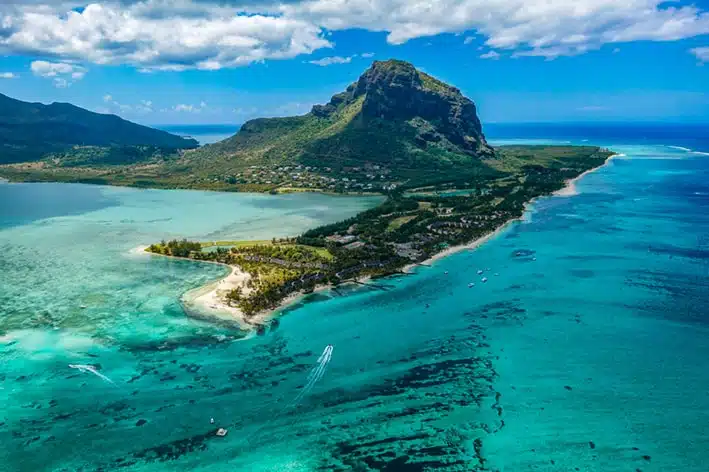The Indian Ocean islands — La Réunion, Mauritius, Seychelles, Mayotte, the Comoros, Madagascar — share fragile lagoons, unique forests, and welcoming communities. The good news: you don’t need to “live like a monk” to travel sustainably. A few well-chosen habits are enough to multiply your positive impact without taking away any joy from your trip.
1) Before you go: choose smarter, not more
-
Accommodation: favor places that clearly explain their efforts (energy, water, waste, local sourcing) and publish simple, measurable goals. Two honest paragraphs beat a mysterious badge.
-
Flights: when possible, pick fewer stopovers and stay longer. A 10–14 day trip often emits less per day than a quick there-and-back.
-
Smart packing: bring what you’ll actually use. Lighter luggage is often the best “carbon gesture” no one sees… but the plane does.
2) Once there: slow down, look around, respect
“Responsible travel” mostly means taking your time. Wander a local market, chat with an artisan, learn a couple of Creole phrases, try a cari at a family table… Those are the moments you’ll remember — and the ones that spread value most fairly in the local economy.
-
Gentle mobility: mix shared cars, buses, e-bikes, and short guided hikes. Short transfers turn into discoveries rather than “logistics.”
-
Local guides: choosing a guide from the island brings stories, off-track places, heartfelt addresses — and supports skills that get passed on.
3) Sea & lagoons: beautiful ≠ indestructible
Coral reefs and seagrass beds are real nurseries. They break, stress, and bleach. The best care: gentleness.
-
In the water: avoid standing on coral; don’t touch turtles; keep a comfortable distance from wildlife.
-
Sunscreen: choose mineral filters and apply after you swim. Better yet: UV-protective lycra + hat = less sunscreen, more comfort.
-
Boat trips: pick operators who limit group size, brief you on approach distances, and put nature before the photo.
4) Fresh water: the islands’ invisible gold
On an island, drinking water is scarce and desalination has an energy cost. Adopt these reflexes without thinking:
-
Short showers, tap off while brushing, towels on request.
-
If your accommodation offers filtered water in carafes, use it. That avoids dozens of small bottles — and saves your budget.
5) Eating & shopping: joy is truly local
-
On the plate: go for seasonal food, market fruit, and fish caught within the rules (ask; a proud restaurateur will tell you).
-
Souvenirs: bet on handicrafts (basketry, weaving, textiles, spices) and avoid anything made from wild animals, coral, or live shells.
-
Fair price: if it’s too cheap to be true, someone in the chain isn’t earning a living. Choose one quality piece over three throwaway trinkets.
6) Nature activities: authenticity shows in the details
A good operator:
-
explains where your money goes (guides, conservation, communities),
-
gives an environmental briefing before the activity,
-
is willing to say no (weather, season, sensitive zones),
-
shows concrete commitments (small groups, no baiting, no flash on nocturnal wildlife).
If you hear “we do what we want here,” walk away.
7) Culture & photos: the elegance of consent
-
People: a smile and “may I take your photo?” open far more doors than a long-lens snap.
-
Sacred places: cover shoulders, remove shoes if asked, follow local customs — you’ll be warmly received.
8) Waste: the best waste is what you never create
No guilt trip — go for simple:
-
refills (toiletries, water, coffee),
-
a reusable market bag,
-
sorting where available,
-
and for “tricky” waste (batteries, e-waste), the easiest plan is… don’t produce any while on holiday.
9) Give better rather than give more
Instead of spontaneous donations that can upset local balances, favor:
-
local NGOs recommended by your host or tourist office,
-
participatory outings (planting, beach clean-ups, turtle counts) supervised by professionals,
-
clear tips for the people who look after you every day.
Small gestures — but the ones that last.
10) Go home different (and proud)
The best souvenir of a sustainable trip is wanting to return — to landscapes that are still thriving. Back home, share your good addresses and leave reviews that highlight the concrete actions of hosts and operators. You’ll help the next travelers choose — and encourage those who do things right to keep going.
In short (promise, it’s easy)
-
Choose accommodation that explains its actions clearly.
-
Stay longer, move gently.
-
In the sea, respect distances and coral.
-
Treasure fresh water.
-
Eat local & seasonal, buy handmade.
-
Prefer guided, responsible activities.
-
Ask permission before photographing people.
-
Reduce waste without making life complicated.
-
Support local initiatives that endure.
-
Share your sustainable tips when you get back.
These ten habits fit on one page — and they genuinely change things. The Vanilla Islands will offer their most beautiful postcards; in return, leave a light footprint and come back with stories that make others want to travel better.







